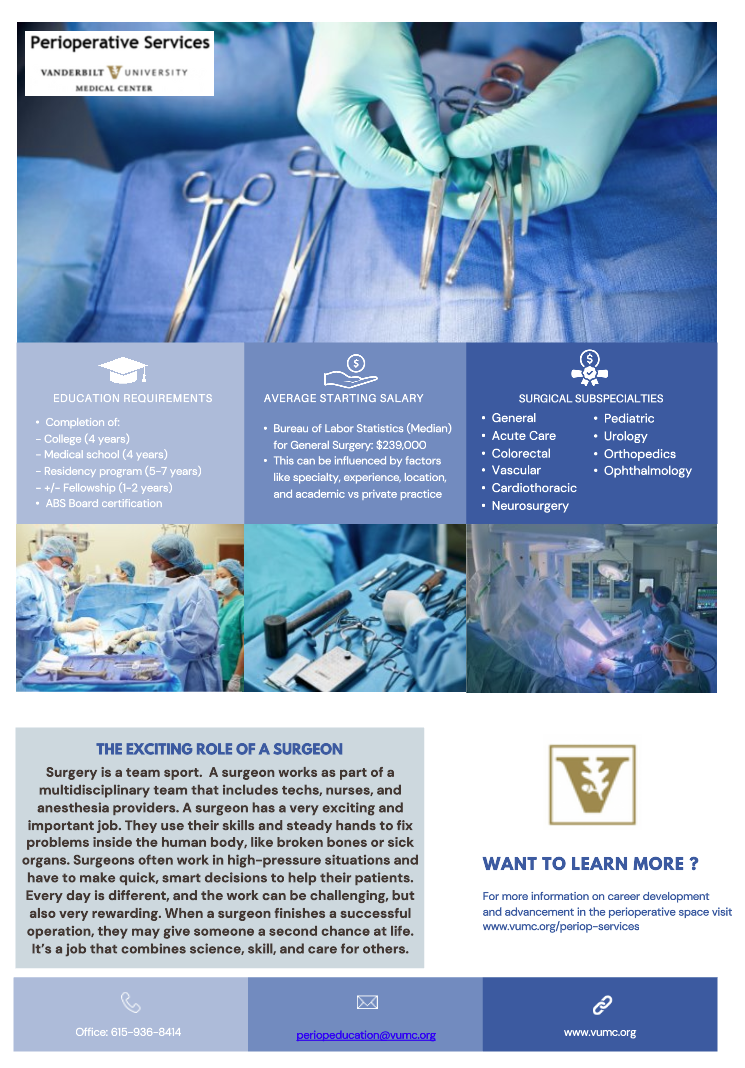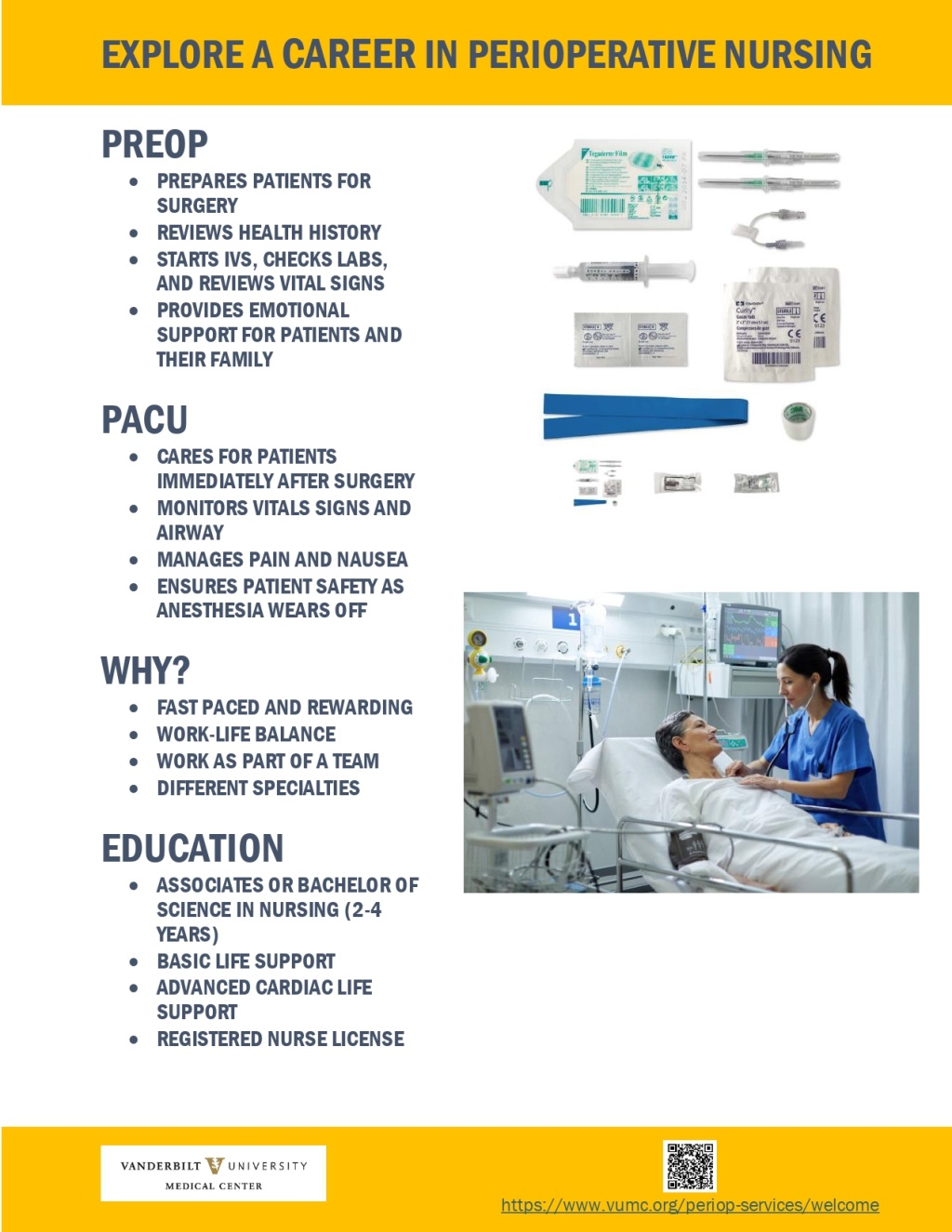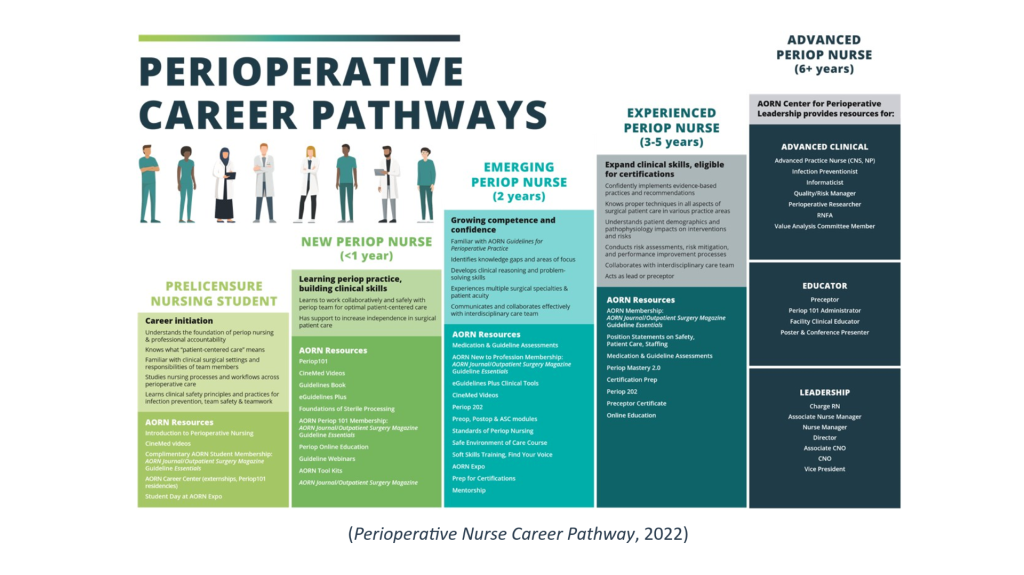Vanderbilt University Medical Center (VUMC) is committed to engaging our future colleagues in clinical experiences which will help shape them into competent and capable perioperative healthcare professionals as well as outreach to future students in programs which prepare them for work in the perioperative field.
If you are a student with an interest in a perioperative career but NOT yet enrolled in a program with clinical rotation, you can learn more about what Perioperative Services has to offer below!
Vanderbilt Observational Experience (VOE)
- After graduating high school, an individual may pursue an 8-hour observational experience in various healthcare career paths through the VOE program. This program requires a few steps, including submission of an application. Look into this opportunity at the VOE site.
- For observations in the operating room specifically (Surgical Technology, OR Nursing, Nurse Anesthesia, or First Assisting), also visit the Visitors in the OR webpage and review the FAQs for observers.
Recruitment
Specific Career Paths
Learn more about different career paths in the perioperative field below. If you would like more information on any of these, please reach out to PerioperativeCareers@vumc.org.
-
Anesthesia technology is an allied health profession specifically focused on clinical procedures which assist the anesthesia provider in the safe and efficient care of patients.
Anesthesia technologists are trained to anticipate the needs of the patient and the provider as determined by the surgical requirements, procedure, or circumstance.
A Day in the Life of an Anesthesia Tech [video]
Cost of Anesthesia Tech Program
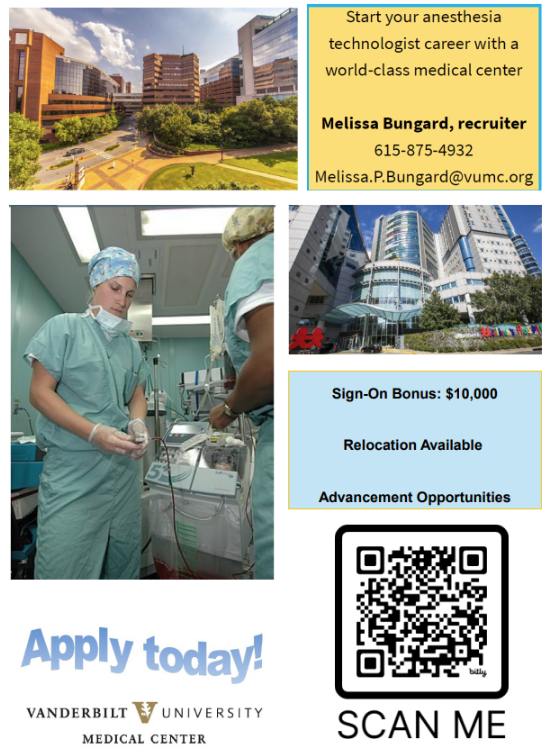
-
A Sterile Processing Technician plays a vital role in healthcare by ensuring that surgical instruments and medical equipment are properly cleaned, sterilized, and prepared for use. Their work directly impacts patient safety and the efficiency of medical procedures.
What is Sterile Processing? | Healthcare Sterile Processing Association (HPSA)
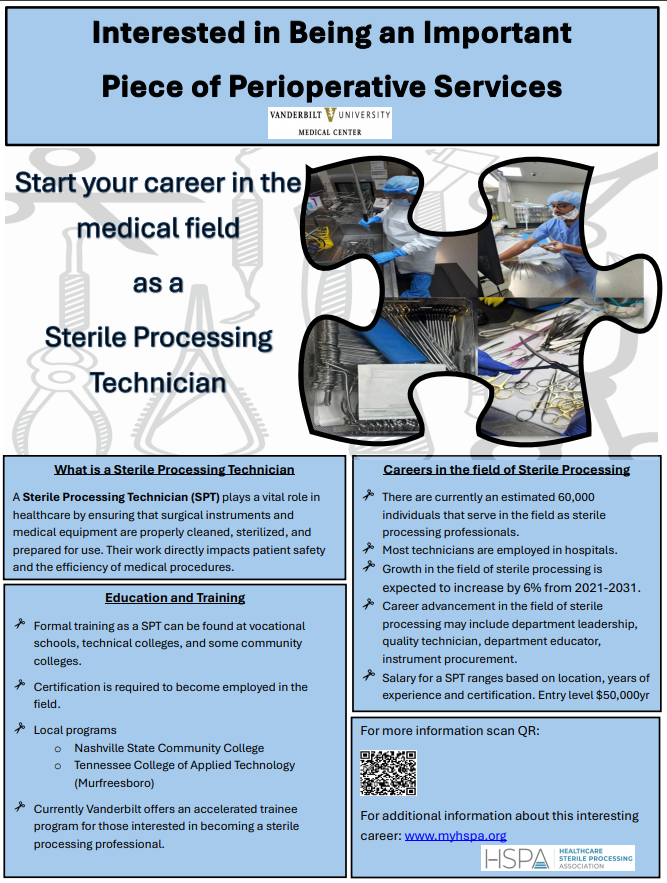
-
A Surgical Technologist works alongside surgeons to assure the integrity of supplies, instrumentation, and other equipment used for surgery. They must be familiar with a plethora of surgical procedures, be able to anticipate the needs of the surgeon as surgery progresses, and maintain an organized working space to account for items used in the procedure.
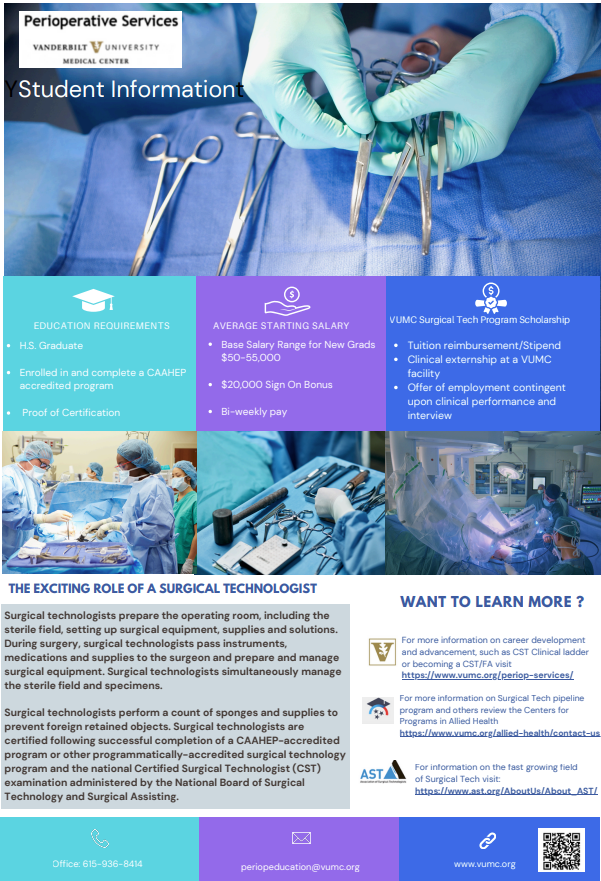
-
A Radiology Technologist (RT) operates sophisticated imaging equipment, such as X-ray and CT scanners, to create diagnostic images of a patient's body for physicians to review and diagnose conditions. RTs may also work with other diagnostic tools like MRI and fluoroscopy, and some specialize further, such as in mammography or interventional radiology.
Key responsibilities include preparing patients for procedures, accurately positioning them and the equipment, adjusting equipment settings, and applying radiation safety protocols to protect themselves and patients.
A flyer about radiology technologists is in development. Check back later!
-
Care Partners (known at other establishments as Patient Care Techs or Nurses Aides) are direct patient care team members who perform basic nursing and patient care duties under the direction of a licensed nurse. These duties include assisting with activities of daily living (ADLs) like bathing, feeding, and toileting; taking and recording vital signs; repositioning and ambulating patients; maintaining patient comfort; and documenting observations in electronic medical records. Care partners also help with clerical tasks, unit organization, and communication between patients, families, and the healthcare team.
A flyer about care partners is in development. Check back later!
-
Nurses who work in the preoperative holding room and the post-anesthesia care unit (PACU) provide patient care before and after surgery.
Before surgery, the nurse will prepare patients for procedures by assessing their health, educating them on what to expect, and confirming their records are in order. After surgery, they monitor patients' recovery from anesthesia, managing pain and vital signs until the patient is ready for discharge or transfer to another unit.
Pre-operative Responsibilities
- Patient Assessment: Conduct a comprehensive assessment of the patient's physical and psychological needs, reviewing their medical history, current medications, and any diagnostic tests.
- Preparation: Ensure the patient's room and necessary equipment are ready, and coordinate lab work and other pre-operative studies.
- Education & Counseling: Provide preoperative teaching to patients and their families, answering questions and addressing any concerns about the procedure.
- Documentation: Confirm and verify surgical consent forms are accurate.
Post-operative Responsibilities (PACU)
- Monitoring: Continuously monitor patients for changes in vital signs and assess their level of consciousness as they recover from anesthesia.
- Pain Management: Administer pain medication and other prescribed treatments to ensure patient comfort.
- Care Coordination: Coordinate with other members of the surgical team to manage the patient's transition, including providing immediate post-operative care.
- Discharge Planning: Safely complete the discharge process, providing appropriate post-operative instructions and assisting the patient to their vehicle.
Key Skills and Qualifications
- Clinical Skills: Requires strong knowledge of anesthesia drugs and their effects, as well as expertise in monitoring vital signs and recognizing complications.
- Communication: Excellent positive, professional, and supportive communication skills are essential for interacting with patients, families, and the healthcare team.
- Judgment: The ability to make confident, quick decisions and work effectively under pressure is crucial in this fast-paced environment.
- Licensure: Must hold a current state Registered Nurse (RN) license and have completed an accredited nursing program.
-
Nurses who work in the operating room suite are circulating nurses (also known as "circulators"). A circulating nurse is a registered nurse who manages and coordinates patient care in the operating room by handling logistics, communication, and patient advocacy outside the sterile field. Their responsibilities include preparing the OR, setting up equipment, monitoring the patient and sterile environment, accounting for instruments, and documenting the surgery's proceedings to ensure a safe and efficient procedure.
Key Responsibilities
- Patient Advocacy: They advocate for the patient's best interests before, during, and after the surgery.
- OR Preparation: This includes gathering supplies, instruments, and equipment, as well as ensuring the room is properly set up for the procedure.
- Patient Positioning: Assisting with positioning the patient on the operating table and preparing the surgical site.
- Maintaining Sterility: Monitoring the sterile field to prevent contamination and informing the sterile team if the sterility is compromised.
- Communication Hub: Acting as a liaison between the sterile surgical team, the anesthesiologist, and the non-sterile area of the OR.
- Equipment & Supply Management: Delivering necessary instruments and supplies to the sterile field when needed.
- Documentation: Recording the details of the surgical procedure, including the names and titles of personnel, instruments used, and the surgery's timeline.
- Patient Monitoring: Overseeing the patient's vital signs and overall condition throughout the surgery.
- Instrument Counts: Working with the scrub nurse to count instruments and supplies to ensure nothing is left inside the patient.
Key Characteristics
- Non-Sterile Role: Unlike a surgical technologist (ST), the circulating nurse works outside the sterile field.
- Essential Part of the Team: They are a critical component of the surgical team, essential for patient safety and successful outcomes.
- Strong Communication Skills: Crucial for effective coordination and clear communication with all members of the surgical team.
- Organizational Skills: Needed to manage the flow of the surgery and ensure all necessary supplies and equipment are available.
Click image to enlarge!
-
Surgeons diagnoses patient illnesses and injuries, performs operations to treat them, and manages patient care before, during, and after surgery. Before surgery, they meet the patient beforehand to discuss the details of intended procedures and get the patient's agreement. They lead operating room teams, ensuring safe and effective procedures, and collaborate with other medical specialists for comprehensive care. Surgeons specialize in different areas (such as cardiothoracic, orthopedic, or general surgery), depending on the body system or type of condition they treat.
Before Surgery (Preoperative Care)
- Diagnosis: Surgeons evaluate patients to determine the need for surgery, often as a leader of the care team.
- Planning: They decide on the best surgical approach and prepare for the procedure.
During Surgery (Operative Care)
- Performing Operations: Surgeons conduct the actual surgical procedure to repair injuries, remove diseases, correct deformities, or address other medical conditions.
- Leading the Team: They lead the surgical team, which includes anesthesiologists, nurses, and technicians, providing clear direction for a coordinated effort.
After Surgery (Postoperative Care)
- Follow-up: Surgeons monitor patients after the operation to ensure recovery and assess the success of the procedure.
- Coordination: They work with other specialists and pathologists to finalize diagnoses and manage long-term care.
